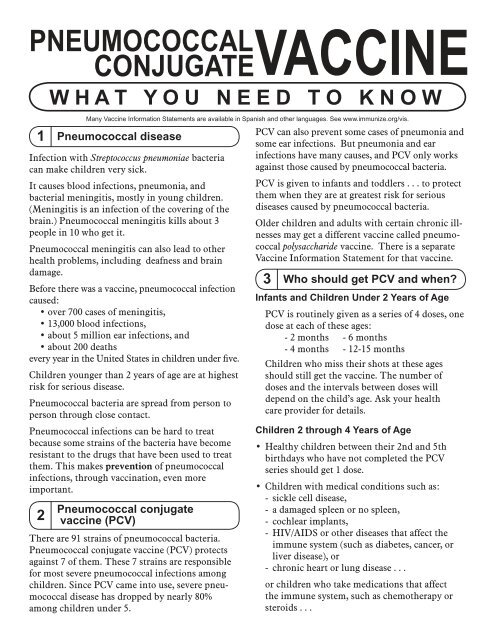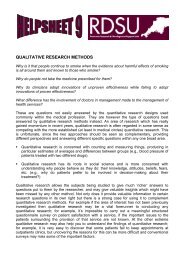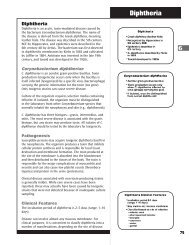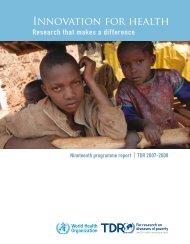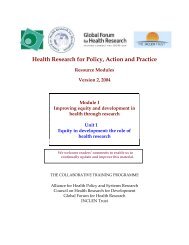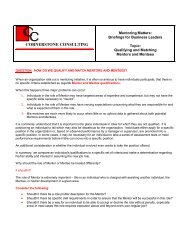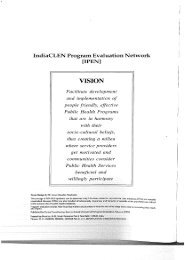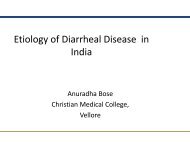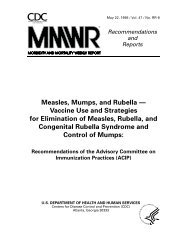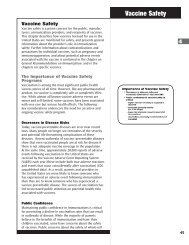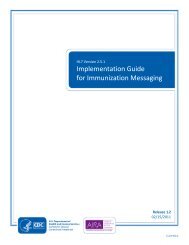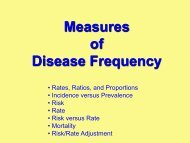PCV - what you need to know - 508 compliant - The INCLEN Trust
PCV - what you need to know - 508 compliant - The INCLEN Trust
PCV - what you need to know - 508 compliant - The INCLEN Trust
Create successful ePaper yourself
Turn your PDF publications into a flip-book with our unique Google optimized e-Paper software.
PNEUMOCOCCALCONJUGATEVACCINEW H A T Y O U N E E D T O K N O W1Many Vaccine Information Statements are available in Spanish and other languages. See www.immunize.org/vis.Pneumococcal diseaseInfection with Strep<strong>to</strong>coccus pneumoniae bacteriacan make children very sick.It causes blood infections, pneumonia, andbacterial meningitis, mostly in <strong>you</strong>ng children.(Meningitis is an infection of the covering of thebrain.) Pneumococcal meningitis kills about 3people in 10 who get it.Pneumococcal meningitis can also lead <strong>to</strong> otherhealth problems, including deafness and braindamage.Before there was a vaccine, pneumococcal infectioncaused:• over 700 cases of meningitis,• 13,000 blood infections,• about 5 million ear infections, and• about 200 deathsevery year in the United States in children under five.Children <strong>you</strong>nger than 2 years of age are at highestrisk for serious disease.Pneumococcal bacteria are spread from person <strong>to</strong>person through close contact.Pneumococcal infections can be hard <strong>to</strong> treatbecause some strains of the bacteria have becomeresistant <strong>to</strong> the drugs that have been used <strong>to</strong> treatthem. This makes prevention of pneumococcalinfections, through vaccination, even moreimportant.2Pneumococcal conjugatevaccine (<strong>PCV</strong>)<strong>The</strong>re are 91 strains of pneumococcal bacteria.Pneumococcal conjugate vaccine (<strong>PCV</strong>) protectsagainst 7 of them. <strong>The</strong>se 7 strains are responsiblefor most severe pneumococcal infections amongchildren. Since <strong>PCV</strong> came in<strong>to</strong> use, severe pneumococcaldisease has dropped by nearly 80%among children under 5.<strong>PCV</strong> can also prevent some cases of pneumonia andsome ear infections. But pneumonia and earinfections have many causes, and <strong>PCV</strong> only worksagainst those caused by pneumococcal bacteria.<strong>PCV</strong> is given <strong>to</strong> infants and <strong>to</strong>ddlers . . . <strong>to</strong> protectthem when they are at greatest risk for seriousdiseases caused by pneumococcal bacteria.Older children and adults with certain chronic illnessesmay get a different vaccine called pneumococcalpolysaccharide vaccine. <strong>The</strong>re is a separateVaccine Information Statement for that vaccine.3Who should get <strong>PCV</strong> and when?Infants and Children Under 2 Years of Age<strong>PCV</strong> is routinely given as a series of 4 doses, onedose at each of these ages:- 2 months - 6 months- 4 months - 12-15 monthsChildren who miss their shots at these ages should still get the vaccine. <strong>The</strong> number of doses and the intervals between doses will depend on the child’s age. Ask <strong>you</strong>r healthcare provider for details.Children 2 through 4 Years of Age• Healthy children between their 2nd and 5thbirthdays who have not completed the <strong>PCV</strong>series should get 1 dose.• Children with medical conditions such as:- sickle cell disease,- a damaged spleen or no spleen,- cochlear implants,- HIV/AIDS or other diseases that affect theimmune system (such as diabetes, cancer, orliver disease), or- chronic heart or lung disease . . .or children who take medications that affectthe immune system, such as chemotherapy orsteroids . . .
should get 1 or 2 doses of <strong>PCV</strong>, if they have notalready completed the 4-dose series. Ask <strong>you</strong>rhealth care provider for details.<strong>PCV</strong> may be given at the same time as othervaccines.4Some children should not get<strong>PCV</strong> or should waitChildren should not get pneumococcal conjugatevaccine if they had a serious (life-threatening)allergic reaction <strong>to</strong> a previous dose of this vaccine,or if they have a severe allergy <strong>to</strong> any vaccinecomponent. Tell <strong>you</strong>r health-care provider if <strong>you</strong>rchild has ever had a severe reaction <strong>to</strong> any vaccine,or has any severe allergies.Children with minor illnesses, such as a cold, maybe vaccinated. But children who are moderately orseverely ill should usually wait until they recoverbefore getting the vaccine.5What are the risks from <strong>PCV</strong>?Any medicine, including a vaccine, could possiblycause a serious problem, such as a severe allergicreaction. However, the risk of any vaccine causingserious harm, or death, is extremely small.In studies (nearly 60,000 doses), pneumococcalconjugate vaccine was associated with only mildreactions:• Up <strong>to</strong> about 1 infant out of 4 had redness,tenderness, or swelling where the shot wasgiven.• Up <strong>to</strong> about 1 out of 3 had a fever greater than100.4°F, and up <strong>to</strong> about 1 in 50 had a higherfever (over 102.2°F).• Some children also became fussy or drowsy, orhad a loss of appetite.No serious reactions have been associated with thisvaccine.Life-threatening allergic reactions from vaccinesare very rare. If they do occur, it would be within afew minutes <strong>to</strong> a few hours after the vaccination.Vaccine Information Statement (Interim)Pneumococcal Conjugate Vaccine 42 U.S.C. §300aa-2612/9/086What if there is a severereaction?What should I look for?Any unusual condition, such as a high fever orbehavior changes. Signs of a severe allergicreaction can include difficulty breathing,hoarseness or wheezing, hives, paleness, weakness,a fast heart beat or dizziness.What should I do?•Call a doc<strong>to</strong>r, or get the person <strong>to</strong> a doc<strong>to</strong>rright away.•Tell the doc<strong>to</strong>r <strong>what</strong> happened, the date andtime it happened, and when the vaccination wasgiven.•Ask <strong>you</strong>r provider <strong>to</strong> report the reaction byfiling a Vaccine Adverse Event ReportingSystem (VAERS) form.Or <strong>you</strong> can file this report through the VAERSwebsite at www.vaers.hhs.gov, or by calling1-800-822-7967.VAERS does not provide medical advice.<strong>The</strong> National Vaccine Injury7 Compensation ProgramA federal program exists <strong>to</strong> help pay for the care ofanyone who has a serious reaction <strong>to</strong> a vaccine.For more information about the National VaccineInjury Compensation Program, call1-800-338-2382 or visit their website atwww.hrsa.gov/vaccinecompensation.8How can I learn more?• Ask <strong>you</strong>r provider. <strong>The</strong>y can give <strong>you</strong> the vaccinepackage insert or suggest other sources ofinformation.• Call <strong>you</strong>r local or state health department.• Contact the Centers for Disease Control andPrevention (CDC):- Call 1-800-232-4636 (1-800-CDC-INFO) or- Visit CDC’s website at www.cdc.gov/vaccines.DEPARTMENT OF HEALTH AND HUMAN SERVICESCenters for Disease Control and Prevention


